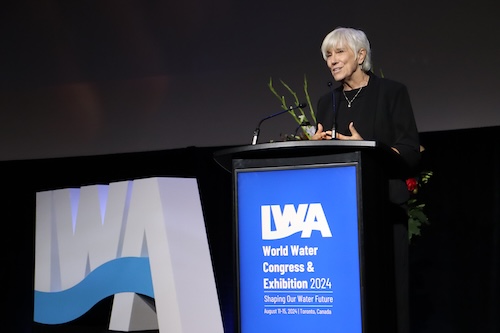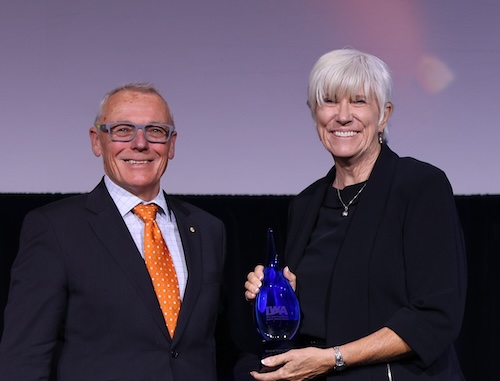Michigan State University water microbiologist Joan Rose was honored for her lifetime of water research with the International Water Association Global Water Award. She was recognized Aug. 10 at the IWA World Water Conference in Toronto, Canada.
It’s the latest accolade in a storied career for Rose, who is the Homer Nowlin Chair in Water Research and director of the MSU Water Alliance. In 2016, she received the Stockholm Water Prize, the world’s most prestigious water award. She is also a member of the National Academy of Engineering and was named an honorary citizen of Singapore for her work on the country’s water system. Over the years, Rose has published more than 300 articles on her research in water quality and its impact on human health.
While the IWA award isn’t her first recognition, it’s humbling every time, according to Rose.
“I’m very proud of it,” she said. “It’s a great recognition of what the health-related water microbiology specialty group has done.”

From Florida to Milwaukee
Rose couldn’t have imagined where her career would take her when she was a new researcher. As an undergraduate at the University of Arizona, she was drawn to microbiology and the idea that an unseen world of microbes could wreak havoc despite their size. Then, a job at a wastewater treatment plant clinched what she’d already suspected — her future would be in water microbiology.
At the time, water research was still a male-dominated field. The first time she attended a water conference in the 1980s, women in tutus roamed the conference floor selling cigarettes. Not many women were considered top researchers or winning awards.
A few mentors, including the top environmental microbiologist in the world, Rita Colwell, encouraged Rose and set an example of what’s possible. Rose watched Colwell win top water prizes and lead organizations like the National Science Foundation. Colwell pushed for more women’s voices and made it her goal to promote women to be president of the American Society for Microbiology, for example.
“She didn’t apologize for telling people, ‘You don’t have enough women’s voices here,’” Rose said. “She told them, ‘You’re missing half of what’s going on and half the intellectual capacity.’”
Rose’s first assistant professor job took her to the Florida Keys, where she and a team had just $2,000 to study the efficacy of septic tanks. Rose remembers flushing tracers down the toilet every two hours and heading out in boats to take water samples. Sure enough, the same tracer that had just been in their toilet showed up in a canal where people swam, fished and drove expensive boats.
Climate change was already a major factor, even in the early 1990s. Rose could see a correlation between El Nino climate patterns and overflowing septic tanks in Florida. She worked with scientists who learned to predict a coming El Nino based on warming ocean temperatures. Rose won grant funding to study virus transport from watersheds into the bay because of the changing weather patterns. It was the first time she’d considered the relationship between the climate and water quality.
Rose was already studying a waterborne protozoa called cryptosporidium just as Milwaukee was hit by a major outbreak in 1993. She had studied all the literature she could find on the pathogen and new detection methods. So, when Rose got a call that people were dying from drinking their tap water, she headed to Milwaukee with a team from the Centers for Disease Control.
Over the next several days, she met with utility companies, public health representatives and scientists. Rose was told that the utilities were meeting the Safe Water Drinking Act requirements at the time.
“I said, ‘Well, the standards aren’t good enough for this new pathogen,’” Rose said.
Rose testified before Congress as it reauthorized the Safe Water Drinking Act. She also traveled around the U.S., meeting with water utilities and taking samples from their water supplies. When a journal wanted to publish her paper on cryptosporidium just after Christmas, she typed away at her final draft in between family celebrations at her sister’s house.
Going global
Rose’s tenure at MSU drew her into global work. She found herself in Malawi visiting water utilities and doing risk assessment work in Uganda. Then, she got a call that a new project in Singapore needed her help building a reuse facility. The country had a water compact with Malaysia that was coming to an end. Without any desalination facilities, the island was facing water insecurity.
So, Rose joined the independent advisory committee for Singapore’s four taps program — water catchment, recycling, desalination and imports. She visited the country twice a year for five years to advise scientists as they developed and tested new technology to produce high-quality water for the public. When the project was over, the chairperson asked Rose to stay on board as they moved from a pilot program to a full-scale system. Today, Rose is an honorary citizen and has visited Singapore at least yearly for 25 years.
“Now they’re known around the world as being a global hub for modern and innovative water science and technology,” Rose said.
New frontier in wastewater

Long before the global pandemic, Rose had tested wastewater and sewage for enteric viruses — those caused by microorganisms that result in intestinal illnesses. Researchers traditionally used these tests to ensure viruses were being removed downstream from treated wastewater.
COVID-19 still seemed like a distant problem when Rose got a call in late 2019 from Gertjan Medema, a Dutch microbiologist and former visiting MSU Hannah Distinguished Professor. He said there were reports that the SARS virus was being found in feces, and that it replicated in the gut. He told her he planned to use it to monitor public health in the Netherlands.
Then, after MSU shut down at the start of the pandemic in 2020, a doctoral student approached Rose asking for permission to come back to campus and study SARS in sewage. By April, a team was on campus taking sewage samples. Eventually, Rose helped to develop the Wastewater SARS Public Health Environmental Response, or W-SPHERE. She worked with Shannon Briggs from the Michigan Department of the Environment, Great Lakes and Energy to test sewage around Michigan and provide public health officials with crucial data to protect the community and make policy decisions.
The pandemic was a twist in her long career that Rose didn’t see coming.
“You would never be able to predict something like this,” Rose said. “Sometimes I think, ‘I wonder what’s going to happen next?’”
After decades of water research, Rose isn’t done. There’s always a new pathogen to track, a new crisis to address and a new opportunity for innovation. She still loves the work and the people who collaborate with her. While she doesn’t know what new challenge lies ahead, she’s still energized and ready for whatever comes next.